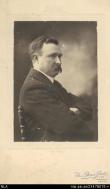Edwin Greenslade Murphy was the tenth child of Irish-born Edward Murphy, plasterer and clay modeller, and his English wife Ellen (née Greenslade). He had five years of schooling at South Melbourne before starting work with his father in City Road. As a tenor singer, Murphy joined the chorus of the Gilbert and Sullivan operas being presented by J. C. Williamson (q.v.).
Murphy was then attracted to the gold discoveries in Western Australia, arriving in Coolgardie in 1894. His early impressions were scribbled down as 'The Fossicker's Yarn' on the back of an old sugar-bag and someone sent the poem to the Sydney Bulletin with the remark that it was verse written on the goldfields by a dryblower. The Bulletin published it under the pen name 'Dryblower'. Thus Murphy became known as Dryblower, the Goldfields' Poet, who contributed a weekly column of jingles to the Coolgardie Miner.
Murphy and a mate travelled to London in 1895 to float their goldmine, the Esmeralda, on the English market. Financially the journey was unsuccessful but Murphy wrote there for financial and social papers and enjoyed the theatre. On 25 September 1895 at Hackney Register Office he married Emma Eleanor Lowndes and returned to Australia at the time of the South African War. In Western Australia he started work as a journalist for the Kalgoorlie Sun, then moved to Perth where he wrote mainly for the Sunday Times, including a column of jingles, Verse and Worse. In April 1905, with J. E. T. Woods, Murphy founded the penny Sporting Life, to print racing news, but the venture lasted for only one year. During the First World War he worked hard for patriotic causes. A poem, 'My Son', was inspired by his son Harry's enlistment.
In Perth Murphy lived through the Depression and the advent of the 'talkies'. He continued to write satirically on all subjects, with his last writing for the Sunday Times appearing in1938. He died of cancer at East Perth. His papers (the typescripts of 55 poems) are held by the JS Battye Library (MN1491).
 3499585840046898337.jpg
3499585840046898337.jpg